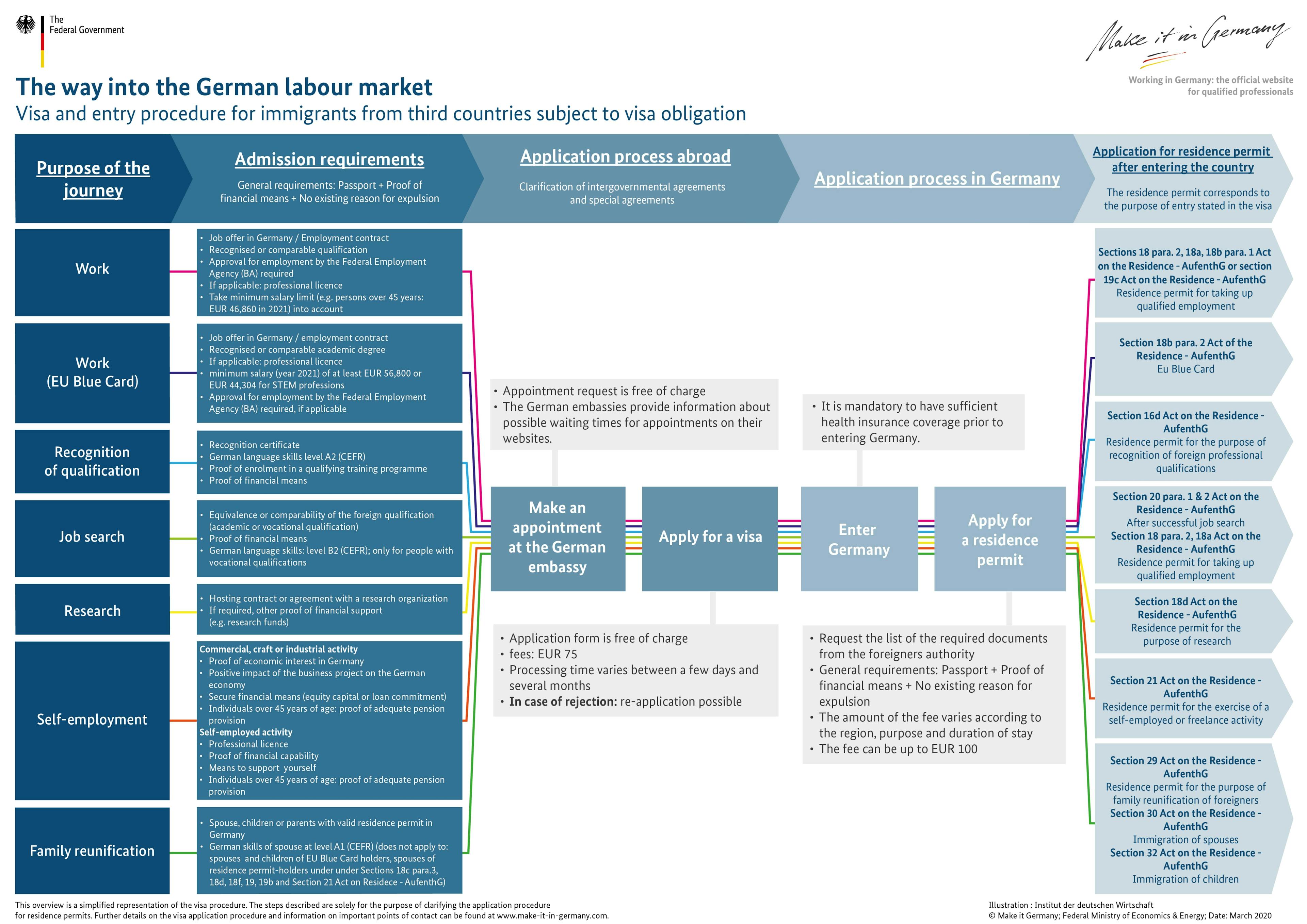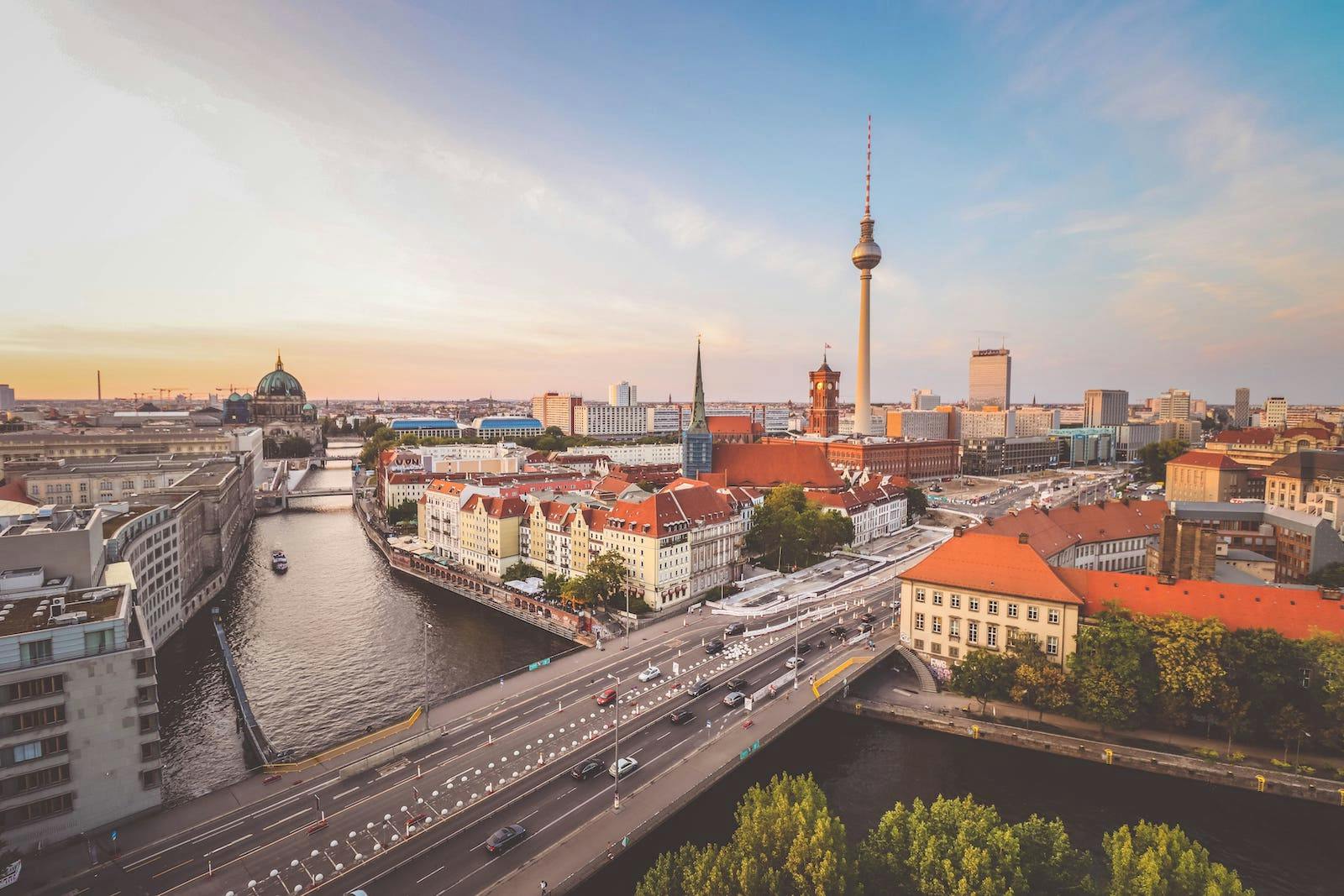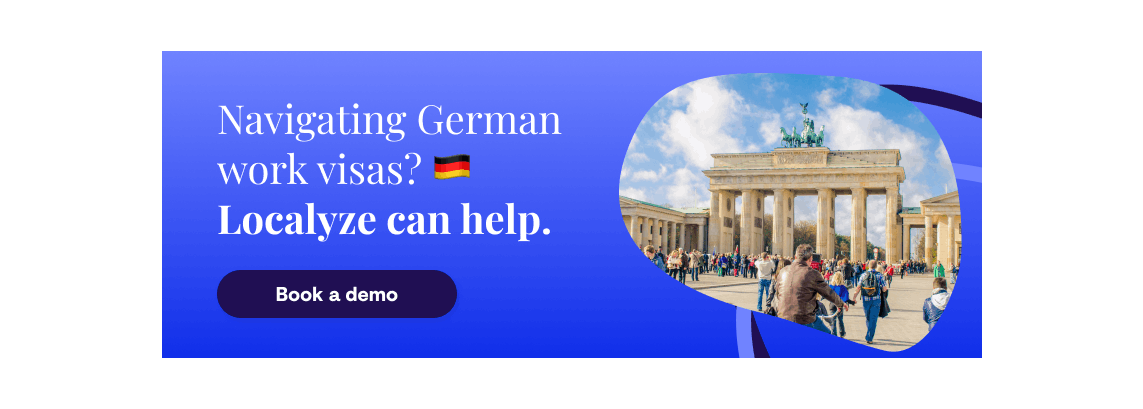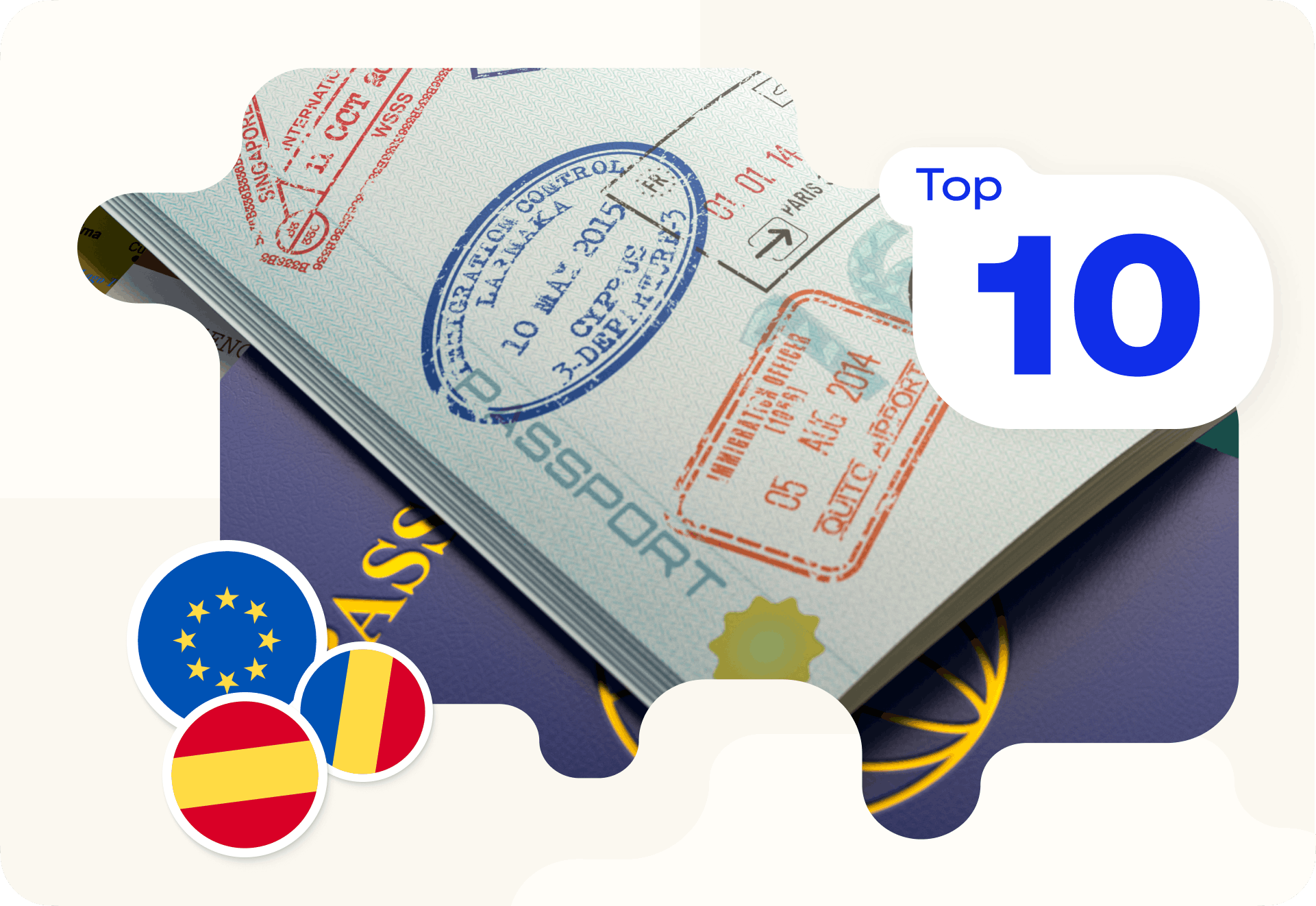To fill priority positions, more and more German employers are hiring talent from outside of the European Union. In most cases, non-EU employees must apply for a work visa. There are several steps to the process, requiring careful attention to detail. This guide will tell you what you need to know.
Note: This article provides a simple overview of the main work permits in Germany. There are other visas and permits available that allow non-EU nationals to enter, work, and live in Germany. For more thorough guidance, contact Localyze.
Who needs a work visa in Germany?
The German work visa is officially called a residence permit for employment, but the terms work visa, work permit, and residence permit are used interchangeably.
Note that the work visa is different from the D visa, which allows non-EU nationals to enter Germany and then apply for a work visa.
Citizens and permanent residents of the following countries do not need a work visa to accept employment in Germany:
- EU member states
- Iceland
- Liechtenstein
- Norway
- Switzerland
Citizens and permanent residents of countries not listed above must apply for a work permit.
The main work permits for non-EU nationals
There are the five main visas that non-EU nationals can apply for:
- EU Blue Card
- Work visa for qualified professionals
- Visa for IT specialists
- Visa for self-employment
- Visa for research
The EU Blue Card
The EU Blue Card is a unique residence permit for highly skilled foreign workers seeking qualified employment in Germany. It is issued for the duration of an employee's work contract, including three additional months, and is limited to 4 years. These are the requirements for the EU Blue Card:
- A German degree, a recognized foreign higher education degree, or a foreign higher education degree comparable to a German higher education degree.
- A concrete job offer from a company in Germany.
- The position must be related to the applicant's university degree.
- The position in Germany must command a gross annual income of at least EUR 48,300 as of 2025. A yearly gross salary of at least EUR 43,759, also as of 2025, is required for employees in shortage occupations. These professions are IT Professionals, Scientists in natural science disciplines, mathematicians, architects, interior, urban, and traffic planners, designers, engineers, scientific engineers, physicians (except dentists), and those with academic qualifications in information and communications technology.
If a candidate you're interested in hiring doesn't meet the qualifications for the EU Blue Card, there are other work permit options.
Find more info on the EU Blue Card.

Image source: www.make-it-in-germany.com
Work visa for qualified professionals
The work visa for qualified professionals is available to professionals that have attended an institution of higher education or received qualified vocational training outside of Germany, and wish to obtain employment in Germany. This visa or residence permit is issued for a maximum of four years. If a work contract has a shorter duration, the residence permit is granted for the duration of the contract. These are the requirements for the work visa for qualified professionals:
- Qualifications must be recognised in Germany, or be comparable to those from a German higher education institution.
- A concrete job offer from a company in Germany.
- If over 45 and coming to Germany for employment for the first time, gross annual salary for the position in question must be at least EUR 46,530 (in 2022). Alternatively, proof of adequate old age pension provisions can be provided.
- Approval of the Federal Employment Agency (BA) is required.
- It must be demonstrated that there are no preferential (nationals of EU member states or the EEA States) workers available for the job.
- The conditions of employment must be comparable with those of domestic employees.
Learn more about the work visa for qualified professionals.
Visa for IT specialists
If you’d like to hire an IT specialist that doesn’t fit the educational or training qualifications for the work permits listed above, there is a third option: the visa for IT specialists. In order to qualify for this visa, applicants must:
- Have a job offer in the IT sector in Germany.
- Provide proof of at least three years of experience in the IT sector over the last seven years. Their professional experience must adequately qualify them for the job in question.
- Provide proof of the relevant theoretical knowledge required for the job in question through training courses and exams.
- Have a job offer with a gross annual salary of at least EUR 43,759.80.
- Have a knowledge of German (B1); exceptions can be made.
- Get approval from the Federal Employment Agency (BA). It must be demonstrated that there are no preferential (nationals of EU member states or the EEA States) workers available for the job. The conditions of employment must be comparable with those of domestic employees.
More info on the visa for IT specialists.
If you're interested in applying for the visa for IT specialists, then be sure to get a copy of our checklist that provides an overview of the application process.
Visa for self-employment
Whether starting a business or working as a freelancer, you can apply for a self-employment visa, although the requirements for each differ.
For those starting a business under the self-employment visa (Selbständiger), applicants must:
- Ensure there is an economic interest or demand for your product or service
- Your profession or business will have a positive economic impact in Germany
- You have financed your business through equity or a loan commitment
If your self-employment is as a freelancer (Freiberufler), then the requirements are slightly different and you can apply for this visa if:
- Your occupation will have a positive impact on German culture and economy
- You can provide proof of sufficient funds to finance your projects
- You have obtained any licences needed to perform your job
Find more info for the self-employment visa.
New: Opportunity Card (Since June 1, 2024)
Germany introduced the Chancenkarte to allow non-EU skilled workers with vocational training or degrees to enter Germany and job-search for up to 12 months, without a job offer. Key points include:
- Eligibility: recognized qualification or two-year vocational training; and A1 German or B2 English
- Points-based system (must score >6 points) when qualifications aren't fully recognized
- Work allowances: up to 20h/week or unlimited 2-week trials during search period.
Visa for research
As a country that values innovation, Germany is open to researchers and scientists from around the world. Depending on your nationality, you will need to apply for a researcher visa. To qualify for this visa, applicants must:
- Be considered a researcher in Germany and have at least a PhD/doctorate or university degree enabling the applicant to access a PhD program.
- Have concluded a hosting agreement or work contract with a research institute in Germany.
- The research institute will cover your living and travel costs back to your home country.
With the visa for research, you can take on a teaching position or work at the research institute listed in your work contract (in Germany and in other EU states) and it’s possible to extend the visa.
Find more information about the visa for research here.
Other ways to take up employment
- Part-time work is allowed on a student visa
Unlike some other countries, international students in Germany are allowed to work in their spare time, and many do. Some may be research assistants in universities while others work in restaurants or retail.
While students from EU countries can work an unlimited number of hours during semester breaks, they are limited to working 20 hours a week during the semester. Non-EU students can work the equivalent of 120 full days.
International students can also take on an internship or work as a freelancer, however any activity regarding self-employment needs consent from the Foreigner’s Authority beforehand. They will also decide if any occupation the student wants to undertake will hinder their studies.
- As a spouse or relative of someone with a valid residence permit
Citizens from non-EU countries who hold a residence permit can bring their spouse and children to Germany. For EU citizens living in Germany, they have the right of free movement, as will their spouse and they won’t require a permit, either.
In many cases, the spouse or child of the permit holder will need to apply for a residence visa from their home country before joining their family in Germany, and the family member already living in Germany must have a residence or settlement permit. However, relatives from certain countries in addition to EU countries (i.e. Australia, Canada, South Korea, and so on) can enter without a visa and apply for one once in Germany.
The spouse of a person with an EU Blue card does not have to prove their knowledge of German and can take up any form of employment without restrictions.
The process of applying for work visas in Germany
Below, you'll find step-by-step guidance on how to apply for a work permit or visa to take up employment in Germany.
Step 1: Check requirements
Ensure that applicants meet the requirements relevant to the work visa they're applying for. The criteria for the EU Blue Card are listed above.
Step 2: Make an appointment at the German embassy
If an applicant meets the criteria above, they must schedule an appointment at the local German embassy in their country of residence to apply for a D-Visa or entry visa. More information on the application procedure and required documents can be found using the German Federal Foreign Office's Visa Navigator tool.
Note: Steps 2 and 3 do not apply to citizens or permanent residents of the following countries:
- United States of America
- Australia
- Canada
- Israel
- Japan
- New Zealand
- Switzerland
- Republic of Korea
- United Kingdom
However, in cases where an employment is intended to begin directly after arrival in Germany, a visa (which includes the work permit) has to be issued in advance, since it is not possible to start working in Germany before having the obligatory work permit.
Brexit and visas: Since Brexit, the UK is no longer part of the EU. Britons who were already resident in Germany before 31.12.2020 may continue to work in the country without restriction. British citizens who have entered Germany after 31.12.2020 to take up employment are considered third-country nationals. They are no longer exempted from having to apply for a work permit.
From April 2025, most work-visa and permit categories - including EU Blue Card, Opportunity Card, Job Seeker, Skilled Worker permits, and researcher visas - must be filed electronically via platforms like the Berlin Service Portal or VIDEX.
Step 3: Apply for D visa in country of residence
The exact requirements for an entry visa will vary from embassy to embassy. However, the items listed below -- categorized by visa type -- are generally required when applying for a visa to enter Germany for work purposes. Applicants should have them ready before their appointment.
For the EU Blue Card:
- Online application form
- Passport
- Biometric passport photo
- University degree
- Job offer that states salary.
- Declaration of employment relationship (Erklärung zum Beschäftigungsverhältnis)
For the work visa for qualified professionals:
- Online application form
- Passport
- Biometric passport photo
- Job offer
- If applicable: pre-approval for fast-track procedure for skilled workers
- Proof that qualifications are recognized in Germany
- Job offer that states salary
- Declaration of employment relationship (Erklärung zum Beschäftigungsverhältnis)
Here are the requirements for the visa for IT specialists:
- Online application form
- Passport
- Biometric passport photo
- Job offer that states salary
- Knowledge of German (B1); exceptions can be made.
- Proof of previous work experience in the IT sector
For the self-employment visa:
- Online application form
- Passport
- Biometric passport photo
- Business and financial plan (for those starting a business)
- Professional license to exercise self-employed activity (e.g. training diploma) for freelancers
- Proof of financial means
For the research visa:
- Online application form
- Passport
- Biometric passport photo
- Hosting agreement or contract with research institution
- Proof of financial means
As the employer, it will be your responsibility to accurately and fully fill out the Erklärung zum Beschäftigungsverhältnis.
The application fee is EUR 75 (in local currency). Processing times can take anywhere from a few days to several months.
Step 4: Come to Germany
Once the entry visa has been issued, applicants should make the necessary travel arrangements for coming to Germany. They will usually be able to start working with this visa immediately, but they must convert it to a residence permit promptly upon arrival.
Important: it’s mandatory for all applicants to have healthcare coverage before entering Germany.
Step 5: Make an appointment to apply for residence permit
Once in Germany, applicants should get an appointment at their local Foreigners’ Authority to apply for a residence permit for the purpose of taking up employment. We recommend doing this as far in advance as possible, as it can be difficult to get an appointment.

Before the appointment, applicants should have the necessary forms fully filled out and all supporting documents well organized. Additionally, an Anmeldung or registration of current address will be required to obtain the final residence permit.
Additionally, an Anmeldung or registration of current address will be required to obtain the final residence permit.
Step 6: Go to appointment and apply for residence permit
Appointments at the Foreigners' Authority generally last no longer than thirty minutes. The meetings are almost always conducted in German, so if the applicant speaks something other than German, you may want to arrange for someone from your company to accompany them.
Assuming the applicant has filled out the required forms entirely and provided supporting documentation, the interview should go smoothly. The average processing time is 8 to 12 weeks.
FAQs
Below are some commonly asked questions and answers related to visas and working in Germany that non-EU nationals, and employers, should be aware of:
How do you change or renew a work permit in Germany?
If you decide to work for another company while holding a valid work permit, you need to apply to have your residence permit for employment or the EU Blue Card amended. Here is the Germany work visa change of employer process:
- Fill out the Erklärung zum Beschäftigungsverhältnis
- Include a copy of the employment contract (a draft is sufficient)
- Submit passport
- Show proof of primary residence
If amending the permit, no fee is required. If the residence permit or EU Blue Card is being extended, the fee is EUR 96.
Depending on the permit you hold, after expiry you may be eligible to apply to become a German Permanent Resident, meaning you won’t have to continue renewing your residence permit every few years and you will be entitled to the same benefits as a German citizen.
What happens if you’re caught working without a work permit?
It’s illegal to work in Germany without a valid work permit, and if a foreigner is caught doing so they may be fined up to EUR 5,000. If persistently repeated, the foreigner can be imprisoned for up to one year or issued a larger fine.
If an employer is caught employing foreigners without valid work permits, they can be issued a fine of up to 500,000 euros.
What happens if your application for a work permit is denied?
If an applicant is unsuccessful with their application, the visa office will state why it was rejected and provide further information on how the applicant can appeal the decision.
Some common reasons applicants are often rejected include:
- Insufficient documentation
- Insufficient or invalid work contract
- Did not meet application requirements (proof of funds, German language proficiency, etc.)
- Documents submitted were believed to be forged or false
The applicant will have one month to appeal in writing (called a ‘remonstration’) and only then will the application be reconsidered. In that letter, you can outline why you believe the decision was incorrect, or you can resolve any issues that led to the rejection.
If the application is rejected again, reasons will again be stated and the applicant can appeal within one month by filing an action with the Administrative Court.
What happens if you lose your job?
Depending on your circumstances and type of permit, if you lose your job in Germany, you will be looked after.
If you hold a current German residence registration and worked a job for at least 12 months in the past 30 months that pays into social welfare (excluding minijobs), you can register at the Arbeitsagentur (employment office) and will be eligible for the Arbeitslosengeld (unemployment money) – as long as you are proactively seeking new employment.
It’s important to begin the process with the Arbeitsagentur as soon as you learn the news of your unemployment to avoid losing any income.
The benefits of working with a relocation partner
As you can see, the process of applying for a work visa in Germany has many steps and can get a bit tricky. And bear in mind that this article only provides a condensed overview. Navigating the bureaucracy is difficult for most Germans; you can only imagine how overwhelming it is for non-Germans.
Many companies try to alleviate their new hires of the stress associated with relocating by assigning the case to an in-house HR manager. This person acts as a liaison between the authorities and employees, which helps streamline the process.
However, immigration can quickly become a complex matter and it may require expertise that your team doesn’t have. In such cases, it’s best to outsource the work to qualified and trusted global mobility experts. Not doing so could mean the difference between your employees’ work permit getting approved and not.
Additionally, delegating relocation case management to a knowledgeable service provider can expedite the visa application process. Instead of asking your HR team to juggle work permit paperwork with a multitude of other tasks, consider placing the work in the hands of professionals that are wholly dedicated to relocation.
The bottom line
Looking for talent outside of the EU is a great way for German employers to find the skills they need for their companies to succeed. In recent years, it’s become easier for non-EU nationals to get work visas. However, the process can still be complex and outside the wheelhouse of many in-house HR teams. Companies can save time and money by contracting the help of global mobility experts.
Need help with relocating an international employee to Germany? Then book a call with Localyze. We'd be happy to assist you in finding a solution.
Note: Note: this article was originally published in 2021 and updated in 2023.
The contents of our website, specifically the articles discussing legal topics, are researched with the utmost care. However, the provider cannot assume any liability for the correctness, completeness, and topicality of the information provided. In particular, the information is of a general nature and does not contain legal advice in individual cases. For the solution of specific legal matters, please consult a lawyer.


